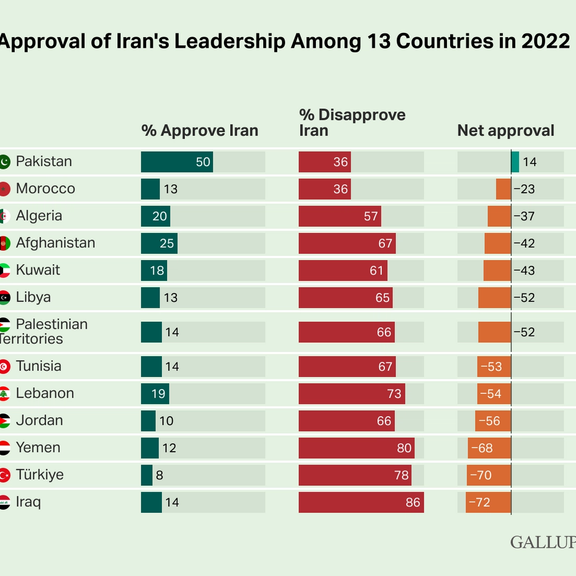Iranian Regime Re-Arrests Prominent Journalist

Iran’s state TV says journalist and political activist Keyvan Samimi was once again arrested on Thursday after his recent release.

Iran’s state TV says journalist and political activist Keyvan Samimi was once again arrested on Thursday after his recent release.
The state TV introduced Samimi as an element linked to Mujahedin-e Khalq claiming that he was arrested on charge of "reconnecting with anti-revolutionary groups abroad".
It is not yet known which intelligence outfit arrested the political activist, but Mustafa Nili, a lawyer, wrote in a tweet that even Samimi's son was unaware of his father's arrest.
Stating that he was informed about the arrest through TV, he wrote "It was very shocking. I called his son, but they had no information and they heard about the arrest from me."
The lawyer also denied the claim by the state TV that his client was released upon "Supreme Leader's amnesty", saying that his release came after he served a sufficient amount of time.
74-year-old Keyvan Samimi, who is known as the oldest imprisoned journalist in Iran, is the editor-in-chief of "Nameh" magazine. He was released from prison on January 26, two months after he began to serve his two-year sentence while his health was deteriorating.
After his release, Samimi supported Green Movement leader Mir-Hossein Mousavi's statement for "holding a free referendum" in Iran and "drafting a new constitution".
Samimi also said in an interview with "Etemad" newspaper that "corruption" in the Islamic Republic began one day after the establishment of the Islamic Republic in 1979.
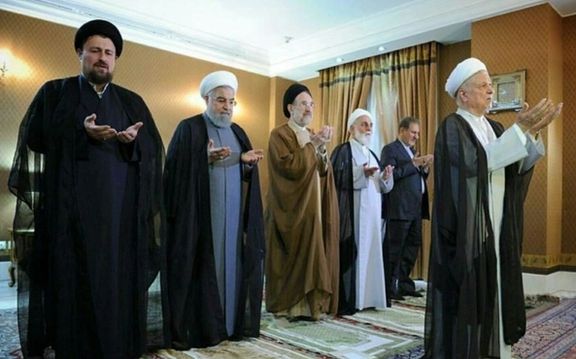
For the second time in less than a week, Iranian media have disclosed hitherto unknown secrets about assassination attempts on the country's former presidents.
Although the coincidence could be the result of rivalry between various media outlets to come up with scoops, the question "Why now?" remains valid.
In the absence of official explanations about why these reports are being published now, some conspiracy theorists maintain that the publication of successive reports about the assassinations may be intended to scare regime insiders who occasionally criticize Khamenei and his hard-headed resistance to change while the country is in deep political and economic crisis.
The latest revelation about an assassination attempt on former President Akbar Hashemi Rafsanjani dates back to 2014 when he was the Chairman of Iran's Expediency Council. The allegation refers to the unpublished parts of Rafsanjani’s memoires saying that security officials arrested a man on charges of setting fire to the offices of two of his secretaries.
Rafsanjani’s family has access to the unpublished volumes of his memoirs.
Rafsanjani who had previously escaped an assassination attempt in 1979, asked the Interior Ministry months later why the case had remained inconclusive. The ministry said that the assassin was handed over to the relevant authorities.
Rafsanjani who was worried about a possible attempt on his own life after being disqualified from running in the 2013 presidential election, further chased the case, but he was told that the authorities cannot trust the assassin's confessions as he made them under duress.
According to memoirs, later, the IRGC changed the story and claimed that the man wanted to kill Supreme Leader Ali Khamenei.
Subsequently, the IRGC insisted on changing Rafsanjani's bodyguards. The former President opposed the idea, and asked Khamenei to intervene. Khamenei ordered the IRGC not to change Rafsanjani's bodyguards, but the IRGC went ahead and retired some of the bodyguards and replaced others, said Rafsanjani's son Mohsen.
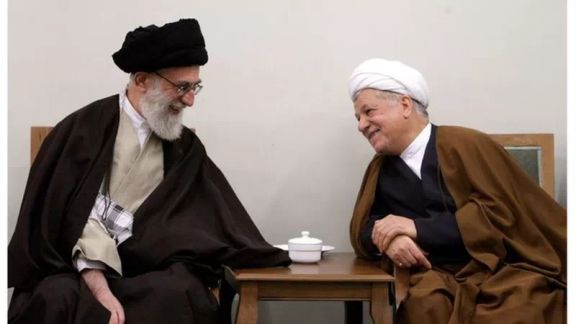
Rafsanjani was Iran's President from 1988 to 1997. The media reported that his successor, the reformist Mohammad Khatami who was in office from 1987 to 2005, was also the target of an assassination attempt in 1999 that never happened. According to these reports, a member of his security team had planned to assassinate Khatami but when he sought a fatwa from Grand Ayatollahs for his murder, one of the clerics told the security agencies that a man was planning to kill Khatami.
The security team, instead of further chasing the case or interrogating the assassin, gave him leave of absence for some time, during which the man went to his hometown in Lorestan Province where he planted a bomb near a government office and was subsequently arrested and the courts began to investigate the assassination attempt on Khatami. According to -then- Deputy Intelligence Minister Saeed Hajjarian, the man was sentenced to just three years in jail.
However, Khatami ordered his office to lend financial assistance to his family members while he was in jail. Khatami later forgave the man and declared that he has no complaint against him, said Hajjarian.
Ironically, a few months later, another assassin attacked Hajjarian and left him physically impaired.
According to Etemad Online, Farshad Toolabi, the assassin who wanted to Kill Khatami later told reporters that he had considered many different ways to kill Khatami, but he finally decided to kill him during a suicide attempt by triggering an explosive vest as he pretended to hug Khatami. Toolabi said that at the time, he was a 30-year-old IRGC captain serving with the security team at the President's Office.
He also said that he was interrogated by intelligence agencies for 18 months before he was finally released from jail after Khatami intervened. He told reporters that he still wishes to see Khatami and thank him for facilitating his release.
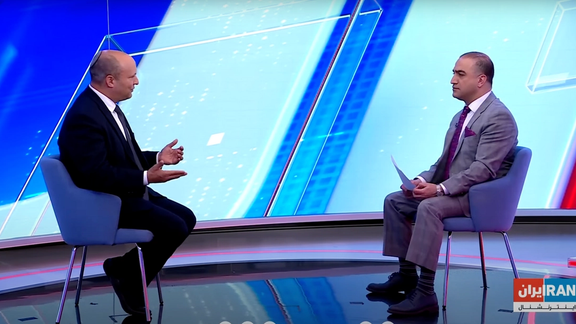
Former Israeli Prime Minister Naftali Bennett compared Iran to a failed state which has infected every country it touches in the region with its dysfunction.
Bennett was speaking in an exclusive interview with Iran International’s Arash Alaei in Washington DC, just hours after the ex-PM had met officials from the Biden administration and been reassured that the US would not tolerate a nuclear Iran.
He said: “Islamic Republic’s biggest export is failed states.
“Every state that the regime touches fails. It touches Lebanon, Lebanon fails; it touches Syria, Syria fails; it touches Yemen, Yemen fails.”
In the wide-ranging interview, Bennett spoke about Iran’s proxy war with Israel, and the historic bilateral ties that according to the Bible began when Persian King Cyrus the Great liberated the Jews from the Babylonian captivity to resettle and rebuild Jerusalem.
He underlined that the Islamic Republic spends tens of billions of dollars every year to support terror groups such as Hezbollah and Islamic Jihad instead of its own people, noting that such a substantial amount should be invested in Iran’s clean water and air issues.
“If I take all of the operations, meaning what they do in Lebanon, what they do in Yemen, what they do in Syria, what they do around the world and the salaries of the Qods forces (IRGC’s extraterritorial division) -- which are the external export of the revolution -- we're talking about a ballpark of $20 to $30 billion a year,” Bennett said.
“Unfortunately, the Islamic Republic simply does not care about its people.”
According to Bennett’s estimates, the Islamic Republic can pay at least two months of minimum wage to each and every one of its 88 million population per year with the money spent on its proxy war.
He also referred to the ‘Women, Life, Liberty’ protests, sparked by the death of 22-year-old Mahsa Amini following his arrest for “improper hijab” in September 2022, and the regime's bloody crackdown on the voices of dissent via heavy sentences and restricting access to internet.
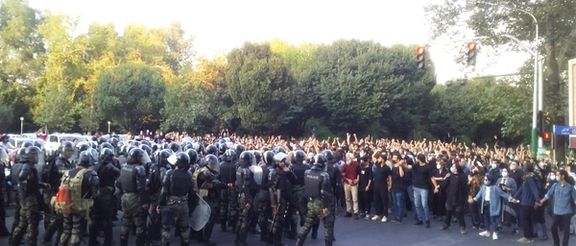
Bennett said that young boys and girls should be able to pursue their dreams, be free to roam social media, and say whatever they want wherever they want, boasting that in Israel “no one will ever stop them on the street and tell them what to do, what to wear and what not to wear." “Every child in Iran should have the ability to pursue happiness and pursue their dreams,” he added.
About the 2015 nuclear deal between Iran and world powers, Bennett said that the value of the JCPOA has eroded because most of the critical provisions are fading, noting that “both America and Israel are fully coordinated on preventing the Islamic Republic from acquiring nuclear weapons.”
Differentiating between Iran’s intentions of making a nuclear bomb and its technical capabilities, he said, “It's not that simple to produce a bomb. We don't want them to acquire a nuclear bomb and we don't want to depend on the intentions that are in the head of one person, Khamenei. Therefore, we don't want that capability to exist in the Islamic Republic... because that would prolong the terrorist nature of the Islamic Republic.”
He also touched on the issue of keeping the Revolutionary Guards in the US list of terrorist groups and called on other countries to follow suit. “President Biden himself committed to me directly when I was prime minister just a few months ago that he would keep the IRGC on the terror list permanently because the IRGC is the world's largest terror group,” he said, adding: “I see across the world that more and more countries are going down that route, be it Australia, the UK, etc.
“The IRGC not only is a huge terror group, it's also one of the biggest violators of human rights on Earth. It's killing its own people. This is crazy. Imagine in America if you had its own Armed Forces killing Americans, that would be crazy.”
On Wednesday, the current Israeli premier, Benjamin Netanyahu, spoke to CNBC in a wide-ranging interview similar to that of Bennett, also warning countries against bolstering ties with the Islamic Republic.
In reaction to Riyadh’s China-brokered deal with its arch-rival Tehran, Netanyahu said, “Those who partner with Iran partner with misery. Look at Lebanon, look at Yemen, look at Syria, look at Iraq.” He added that “95% of the problems in the Middle East emanate from Iran.”
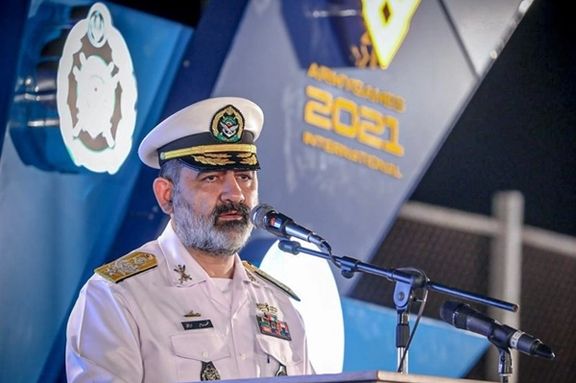
The US has denied claims by Iran that it forced an American submarine to surface as it entered the Strait of Hormuz.
Iranian Navy Commander Shahram Irani said on Thursday that the vessel was underwater as it approached the Strait when it was spotted by an Iranian 'Fateh' submarine which forced it to come to the surface.
Irani said: "The US submarine was approaching while submerged, but the Iranian submarine Fateh detected it and carried out... maneuvers to force it to surface as it went through the Strait (of Hormuz).
“It had also entered into our territorial waters but ... it corrected its course after being warned.”
The Iranian commander claimed: "This submarine was doing its best, using all its capacities, to pass in total silence and without being detected.
"We will certainly reflect to international bodies the fact that it had violated our border."
However, the Fifth Fleet of the US Navy denied such report as Iranian "disinformation". Commander Timothy Hawkins told Reuters that no US submarine has transited the Strait of Hormuz “today or recently”.
He added: "The claim represents more Iranian disinformation that does not contribute to regional maritime security and stability."
Earlier this month, the US Navy confirmed that its nuclear-powered, guided-missile submarine Florida was in the Middle East supporting its Fifth Fleet.
Several confrontations have occurred between Iranian and US forces in the past. Iran's navy said in early April that a US reconnaissance plane had been identified and warned off outside the mouth of the Persian Gulf. Iran shot down a US drone it said was flying over southern Iran in 2019.
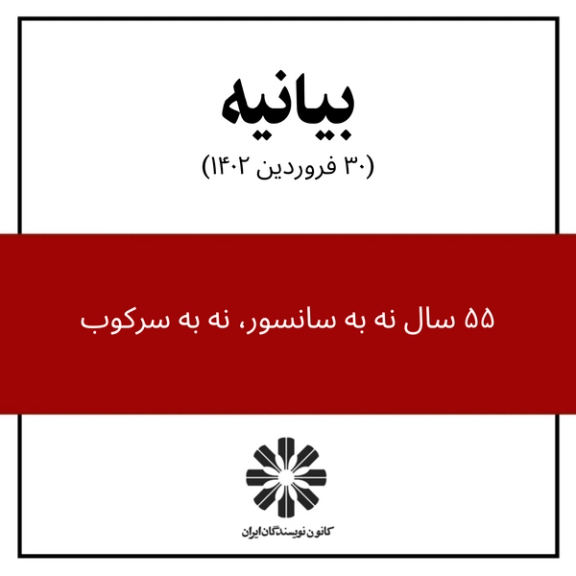
The Iranian Writers’ Association has marked its 55th anniversary by renewing its commitment to freedom of expression in the Islamic Republic.
In a statement, the association said, "Freedom of expression is the gateway to other freedoms, and hope for change does not fit within the framework of tyranny.
"We are celebrating the 55th anniversary of the establishment of the Iranian Writers' Association in a situation that the regime has spilled the blood of countless freedom-seekers and protesters, executed some, and jailed many in prisons."
The association recalled how last year, hours after the murder of 22-year-old Mahsa Amini in police custody, it openly expressed solidarity with the freedom movement of the Iranian people.
The public stance in defiance of the authoritarian regime’s crackdown and crimes has led to the widespread suppression of the Iranian Writers Association, reads the statement.
But the association vowed that the brutal repression will not stop their quest for freedom.
The Iranian regime increased the number of arrests of prominent writers and other artists after popular antigovernment protests broke out in September 2022.
According to PEN America’s 2021 Freedom to Write Index, Iran jailed the fourth-highest number of writers and public intellectuals in the world. In 2022, arrests of writers and other artists have spiked dramatically.
A prominent member of the Writers Association, Reza Khandan Mahabadi, was released in February after months of detention.
He wrote on his Facebook page after his release that the Iranian regime’s suppression of protests added to people's grief, but “it could not put the genie back into the bottle.”
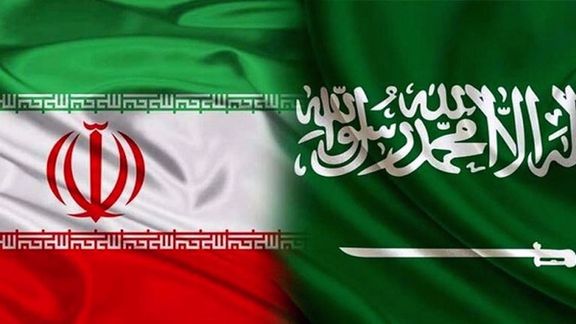
Saudi Arabia has far greater approval ratings than Iran in other Muslim countries across the region, analysis by Gallup reveals.
According to the research conducted in 2022 across 13 Muslim-majority countries by the US-based pollsters, Saudi Arabia's leadership received the approval of 39% of those surveyed, against just 14% for Iran.
The Kingdom showed sharply higher support still both in Kuwait, where a 47%-point approval difference illustrates close ties between Gulf Cooperation Council countries and OPEC partners, and also Libya, where Saudi Arabia enjoys a 41-point advantage in popularity.
Saudi Arabia has greater popularity in all countries polled, stretching from Morocco to Pakistan. The difference is most muted in Turkey, where the advantage is just three points.
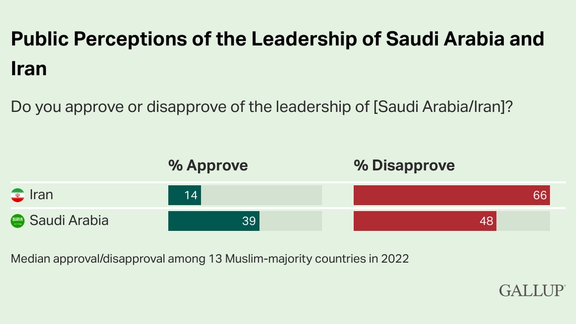
There is a relatively small approval gap in the Palestinian Territories of 12 points, but still Saudi Arabia is more popular there despite Iran’s all-out support for the resistance groups.
Most countries where Iran has had the greatest influence give Tehran low marks, including Iraq (86% disapproval), Yemen (80%) and Lebanon (73%).
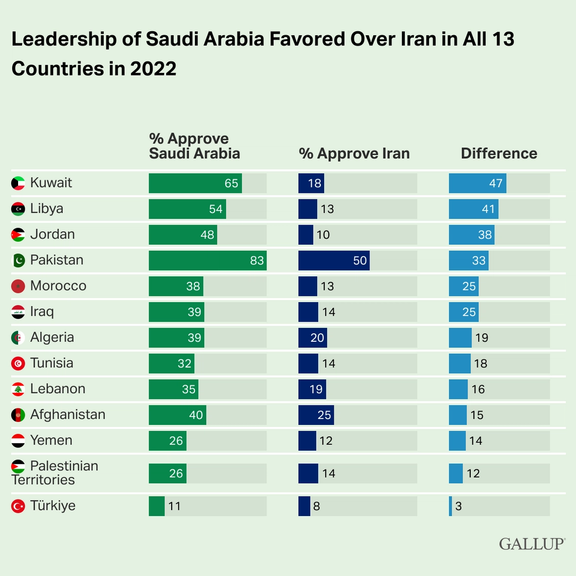
After the 1979 revolution, the theocratic government of Iran quickly formed enemies throughout the Middle East when it demanded overthrow of Gulf monarchies and secular Arab governments. The Islamic Republic’s support for Shia minorities in Sunni-majority countries placed it at odds with the countries in the Middle East.
After seven years of hostility that fueled conflicts across the Middle East, Tehran and Riyadh agreed to end their diplomatic rift and reopen their diplomatic missions in March.
